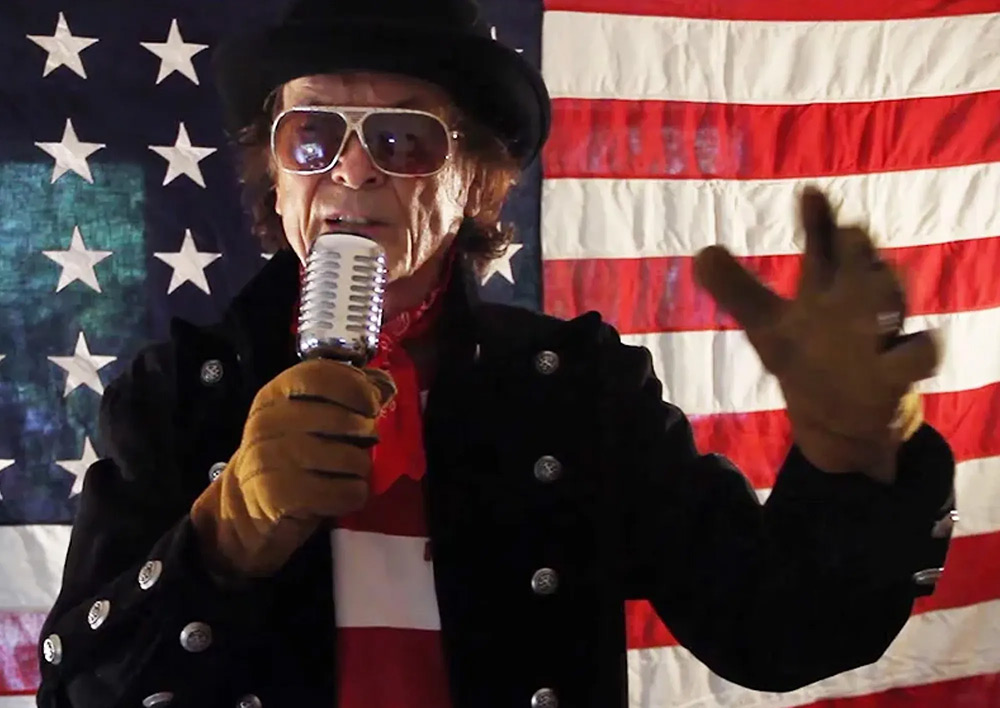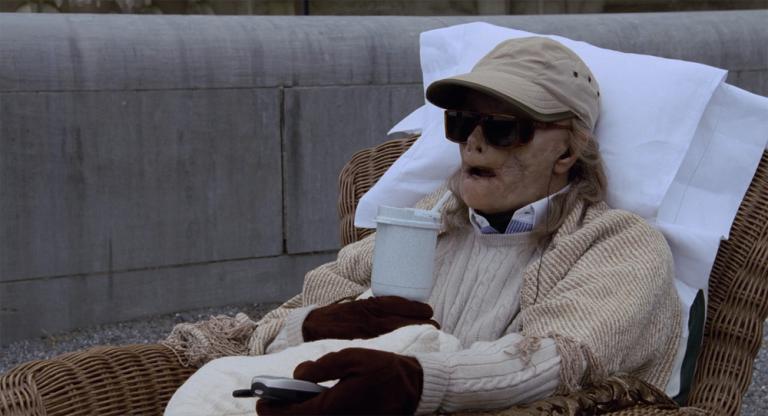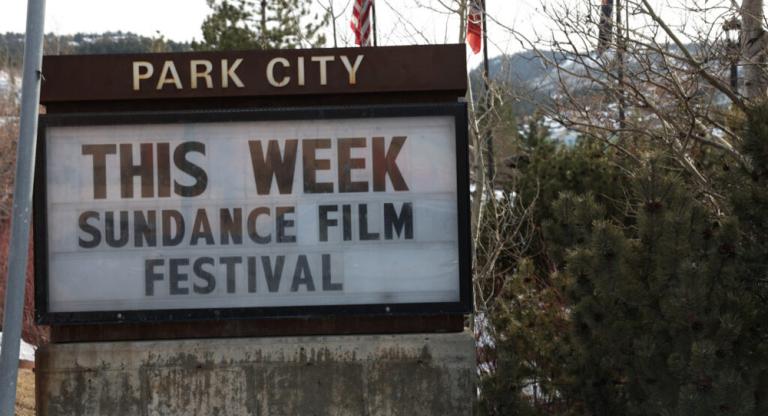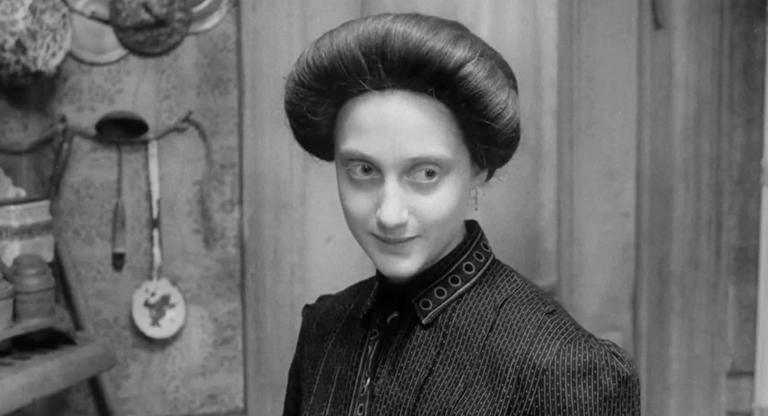Ulli Lommel (1944-2017) led a one-of-a-kind, utterly bizarre, life in the arts. From his earliest days as a cigar chomping four-year-old in the German circus through his final hours, mockumenting the “FreeKS” of Venice Beach in a bedazzled cowboy hat, he left an indelible mark on every project he ever touched. To call his formative achievements eclectic would be an understatement. He (allegedly) performed a duet with Elvis Presley on his fourteenth birthday, while the King of Rock and Roll was enlisted in the U.S. Army and stationed in Bad Nauheim; he was a lead in Russ Meyer’s Fanny Hill (1964); he voiced Robin, the boy wonder, for the German language dubbed version of the 1960’s Batman T.V. show. Higher-brow cinephiles often recognize him as a brooding poster boy for the New German Cinema, though. Lommel worked on an astonishing 22 Rainer Werner Fassbinder films between 1968 and 1977, and even starred in and produced the brilliant Bavarian’s first feature, Love is Colder Than Death (1969). Fassbinder, in turn, produced one his first directorial offerings, The Tenderness of Wolves (1973), a variation on Fritz Lang’s M (1931), with Kurt Raab playing the infamous gay serial killer Fritz Haarmann.
In the late ‘70s, Lommel relocated to New York City, where he schmoozed it up with the Studio 54 set and became friends with one of his heroes, Andy Warhol (a fan of The Tenderness of Wolves). Warhol even delivered cameos in two of his films; Cocaine Cowboys (1979), a drugged out thriller partially set at the pop artist and his cinematic partner-in-crime Paul Morrissey’s Montauk estate, Eothen, and Blank Generation (1980) an Ed Lachman-lensed, vehicle for Richard Hell and the Voidoids. Soon after, Lommel moved to Los Angeles and embarked on a long and frenzied spiral into B-movie oblivion.
The truth is, most people only know Lommel as a low- to zero-budget exploitation auteur, with the horror film Boogeyman (1980) being one of his more infamous titles. While largely sticking with true crime adjacent material, he dabbled in all sorts of genres and directed at a pace so fast it’s nearly impossible to track it all. The concept of “Lommel completism” is legitimately inconceivable. At one point, he directed 17 serial killer movies in the course of four years (2005-2008). Misinformation, or lack of information, on much of his 21st century output hasn’t helped matters either. Try finding Monkey Rap, a 2000 film he directed, featuring Michael J. Pollard, about a 10-year-old boy who befriends a rapping monkey in Arizona.
While Tenderness of Wolves was well received, many of his later projects failed to connect with critics—not that anyone would accuse him of pandering to them. Some of his movies are so outlandish, even by cult standards, it’s hard to even find an entry point. The synopsis for his 1984 new wave musical Strangers in Paradise reads: “Mesmerist Jonathan Sage escapes Nazi Germany via a cryogenic tube. In the 1980s, a group of Fascist Americans thaw him out, hoping to use him as a way to rid their community of homosexuals, free-thinkers, and other ‘radicals.’” In today’s Tomato-Meter-obsessed online garbage dump of gamified opinions, his German Idol-inspired art film Daniel the Wizard (2004) has become synonymous with disastrous aggregated metrics—a difficult mantle to shake. When googling Lommel obituaries, among the first to pop up is an unfortunately titled one, “Ulli Lommel: Cult horror director with lowest IMDB rating dead at 72.”
With “late style” discourse escalating in recent years, virtually everyone knows what “late Eastwood” or “late Malick” means aesthetically, but what about “late Lommel”? It’s impossible to say, as a majority of his final works remain completely unavailable and shrouded in mystery. Lommel passed away in 2017 and his grand finale, America Land of the FreeKS, premiered at the Berlinale in 2018. It hasn’t screened publicly since and isn’t available online anywhere. I first saw the trailer for it not long after the festival and was struck by how different it appeared from so much of his previous work.
In the short teaser, Lommel emerges from the sunroof of a white, stretched limo in his signature cowboy hat with a Mickey Mouse racing jacket on. As doo-wop music plays in the background, a narrator offers, “Come to America land of the FreeKS, to a whole nation going insane.” A montage of campy, over the top sexual transgression, Burning Man shenanigans, aggro gamers, reptilian Hillary Clinton images, and moon landing footage stamped with a big red “FAKE NEWS” label, follow. A lady in a Mouseketeer cap violently chokes, while gorging her face with popcorn from a concession stand tub as the narrator continues, “This is America Land of the FreeKS, where even Mickey Mouse has gone insane. So come to visit us one last time before the party is over.” The film is clearly not another dashed off true crime adaptation for the “free with ads” Roku Stick wasteland. Rather, it’s a personal essay in mondo form. I wondered if Lommel knew the clock was ticking and that this was his last chance to let it all hang out. Sadly, the film was nowhere to be found.
After a prolonged saga attempting to track down America Land of the FreeKS, with the help of a couple die-hard Lommel heads in New York and Berlin, contact was eventually established with the film’s producer, Frank Dragun. As expected, the film, an absurdist satire on life in Donald Trump’s America, is also an autobiographical portrait of a filmmaker who worked with some of the greatest directors of the 20th century and lived through periods of world historic upheaval. Like Agnès Varda’s The Beaches of Agnes (2008) or Abel Ferrara’s Mulberry St. (2010)—which also addresses the theme of a party coming to an end—Lommel offers his take on the present while investigating ghosts from his past. His old Fassbinder peer, Irm Hermann, even makes a surprise appearance in a confounding scene about the naming of America. Dragun produced much of Lommel’s parting catalog, including an intriguing entry called Factory Cowboys: Working with Warhol (2018), with Joe Dellesandro, that has yet to surface properly and another, oddly familiar sounding, mockumentary called Mondo Americana (2017).
On the occasion of America Land of the FreeKS’ U.S. premiere at the Roxy Cinema, it was my pleasure to email with Dragun about Lommel’s swan song, while untangling questions about the iconic director’s final years and projects, including his Michael Jackson themed play, Fucking Liberty!
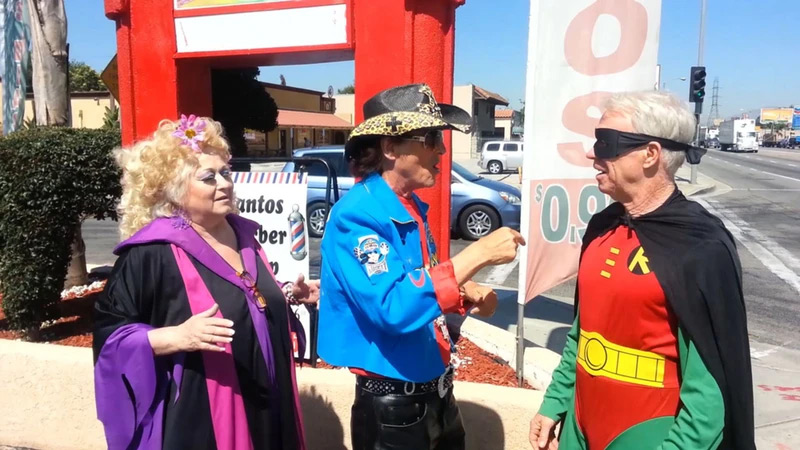
Michael M. Bilandic: How and when did you first meet Ulli Lommel?
Frank Dragun: By chance, around 2014, a mutual acquaintance invited me to a small village, in the middle of nowhere in Germany, for a preview of his film, Mondo Americana. Ulli asked me later that evening what I would change about it. My answer was short and sweet: “Throw out seventy percent, then shoot it again.” So we took a little private money and that's how America Land of the FreeKS got started.
MB: I was chuckling at the Mondo Americana description earlier: “Ligergate Studios wants indie filmmaker Ulli Lommel to direct a new movie about the dark side of Hollywood entitled Mondo Americana. They have put together an odd documentary team for him consisting of a drag queen and a Jewish comedian.” I was curious why it sounded so similar to FreeKS.
FD: That project was never really finished. Another movie was made from the seventy percent that was cut out. Ulli gave the material to his girlfriend at the time. She turned it into her own movie with additional scenes shot by her. It's called Julia 17 (2017). But I never saw it.
MB: So you take the best thirty percent of Mondo Americana and now, all of a sudden, you’re producing Ulli’s 64th directorial effort and travelling stateside to develop it into something more in line with the zeitgeist?
FD: Because of the turbulent political times in the USA, Mondo became FreeKS.
MB: And what do you mean by “freaks”, exactly?
FD: The word is used figuratively in psychoanalysis and refers to the transformation or redirection of drives or emotions into socially acceptable or creative actions. Or the exact opposite. The film shows this transformation in society over recent years. Ulli spent half his life in Europe and the other half in the USA. He could sublimate these changes quite well.
Tod Browning also made a movie with this title in 1932. Incidentally, it was subtitled “misshapen” in Germany and was banned in many countries. It gave viewers a good picture of the mood in the USA during the Great Depression.
MB: Like his mentors, Fassbinder and Warhol, Ulli had a prodigious output and unwavering work ethic. Was it ever challenging collaborating with such a force of nature?
FD: This way of working has been with me since my professional beginnings. Ulli is not the only hard-working person under the sun, although he was one of the fastest. It was all more than a lot of fun.
MB: Your first credit on IMDB is “location manager” for Eckhart Schmidt’s synth-pop grand guignol Der Fan (1982), and you were the “post-production supervisor” on Dušan Makavejev’s Gorilla Bathes at Noon (1993). Have you always been drawn to the more fringe, or provocative, side of filmmaking?
FD: As a young professional, you have to accept almost any job you're offered. I worked with Eckhart Schmidt on several films. I just didn't feel explicitly drawn to those two directors, but I was familiar with their work and held it in high esteem. In the days when the Wall still stood in Berlin, it was extremely interesting for foreign productions to shoot there. Through my production work I got to know a wide variety of people and their methods, like Martin Sheen, Sean Penn, Gene Hackman, Brian Dennehy, Hanna Schygulla and others.
MB: Can you tell me a bit about the making of FreeKS? What was it like filming in Los Angeles?
FD: Growing up in Germany, you are naturally programmed to do everything the right way, thoroughly, and without compromise or spontaneity. Maybe that's why we build such good cars? But it very quickly became clear that things can work differently in Los Angeles.
We didn't have permission for one of the opening scenes, because we were shooting in a moving limo. Who would expect the car to be hit by a strange driver during filming? The policeman who was called in asked for our permit and Ulli countered by asking him if he had ever acted before. So the policeman got to play a nice role, with his gun drawn, that evening. Without salary, of course.
MB: While the film is technically a mockumentary, it constantly blends fact and fiction, like with the cop. How much of Ulli’s performance would you say is the real him and how much of it is a character?
FD: He was one of the most self-reflective people. The movie was briefly pitched as The Ridiculous Life of Ulli L. But, as is the case in life—especially in Ulli's life—everything is constantly changing.
MB: He was always one of the most stylish actor-directors, but the looks he cultivated in his “late period” are his apex. In FreeKS, alone, we see Ulli in a red white and blue durag, a studded black leather motorcycle jacket, a baby blue Mickey Mouse NASCAR jacket, a turquoise jewellery adorned Stetson, a Popeye the Sailor Man trucker cap, an Affliction shirt, and every variation of aviator sunglasses and Chrome Hearts style cross, under the sun. There’s a Michael Jackson influence in there, too. Can you help illuminate his fashion sense?
FD: His credo was always: wear what you want and what you are. He always looked like a weird bird, but inside he was the opposite, an absolutely clear thinking and structured, very hard working person. He was a fan of Michael Jackson and his music, which, as an Iggy Pop fan, I never really wanted to understand. But how do you say? Live and let live?
I suspect that he wore hats all the time because he was half bald. He was somehow embarrassed and never enjoyed it when I said that. When we were out and about he always looked for stores that had clothes in a more unique style. The pile of cowboy hats alone in his last mansion in Berlin was two meters high. He was a very vain person who liked to stand out.
MB: I need to know more about the play he directed, Fucking Liberty! In his book Factory Made (2015) he writes, “The ghost of Warhol told me to play Michael [Jackson].” I read that the show opens with Ulli rising from a casket dressed like M.J. (with one glove on) while Billie Jean blasts from a loudspeaker. Did you work on it or see it live? I believe there are either clips from it, or scenes inspired by it, in FreeKS.
FD: It was a performance at the Volksbühne, one of the most renowned theaters in Germany. Unfortunately, I wasn't able to see it because I didn't meet Ulli until a few weeks later. But I was able to see an internal video recording. And yes, some fragments were included in FreeKS.
MB: He also directed a Tito Jackson video around this time?
FD: We shot Tito in Rio de Janeiro. Unfortunately, he passed away recently.
MB: Ulli, himself, passed away from heart failure, right before the FreeKS premiere, at the age of 72. Had he fully completed his magnum opus?
FD: The film was completed by him four days before he died. The only new additions were the end credits.
MB: How was it received? Also, why hasn’t it played anywhere since?
FD: The two screenings at the Berlinale in 2018 were a complete success, with a thousand viewers each. Nevertheless, no distributor dared to include it in their program because of the subject matter. Perhaps after the NYC screening a courageous distributor will be found. I would very much like to see that, especially in the current situation. The topic is not outdated. Quite the opposite.
MB: So many issues in the film, from identity, to celebrity, to extremism, to borders and immigration, are as pressing now as they were when you first made it. I love how Ulli approaches it all through such an absurdist lens. Trump getting reelected in 2024 certainly gives it all an extra sense of timeliness, as the film is a reaction to his 2016 victory.
FD: The movie is only a partial reaction, though. The fact that the USA has always been a bit crazy was our first thought. The election result only reinforced this and was, of course, immediately incorporated. If you realise that humanity has basically never changed, the movie is really just a longitudinal view of the last few centuries. If you consider that QAnon has exactly the same traits as conspiracy theories in the Middle Ages, it becomes rather clear. Even back then, there were underground hiding places where certain ethnic groups secretly drained the blood of children in order to build themselves an eternal fountain of youth. At that time, however, there were no underground pizzerias where this is said to have happened. As a logical consequence, our main character attends a self-help group for serial killers. Israel, Germany and North Korea also have their say in the movie. So it doesn't seem to be an all American thing.
MB: What else were you two preparing in that final period?
FD: We worked on several films over those last few years; FreeKS, Factory Cowboy, Queen of Rio, Boogeyman - Reincarnation. I also have a few scripts of his lying around. Maybe another director will have the courage to tackle them.
MB: Having spent so much time with him, what are the main lessons you learned from Ulli, either personally or creatively?
FD: Work hard, as if there is no tomorrow.
Always be open-minded, especially to other people, even if you don't agree with them.
Be happy about life.
Just don't know what the word hate means.
I know these sound like Bible verses, but they’re meant to be philanthropic, without any religious ulterior motives—although, for Ulli, religion also counted as pop art.
MB: Finally, in the wake of his death, how would you like to see him remembered?
FD: Like many others, I’ll quote the saying of a wise person: “You are only dead when people stop talking about you.”
AMERICA Land of the FreeKS screens tonight, July 27, at the Roxy. The film will be introduced by Michael M. Bilandic and Gina Telaroli.
